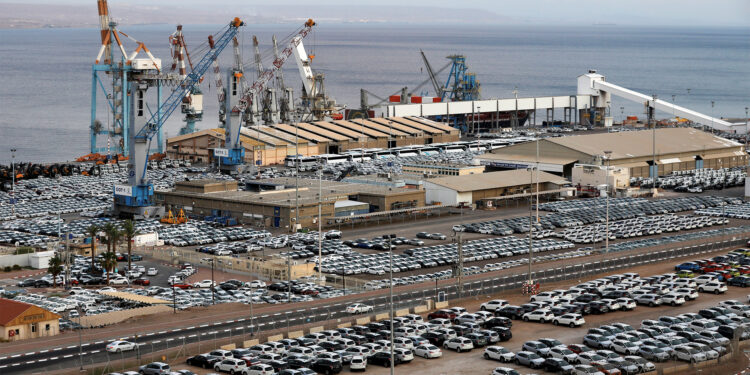The year 2024 witnessed a major collapse in the auto import sector across Israeli ports. The numbers fell to disturbing levels, recording a decrease of 19.5% compared to 2023, according to the report of the Shipping Authority and the Israeli ports published by the “Calist” website.
According to the data, only 277,455 cars were unloaded this year, compared to 344,783 cars in the previous year, which reflects a deep crisis in the sector.
Importers flounder and closure of Eilat
Calcalist notes that this sharp decline is not just a transient fluctuation, but rather a catastrophic management of import operations, as during 2023 the importers brought huge amounts of cars for fear of high taxes on electric vehicles, which led to excessive storage and chaos in distribution. Instead of intelligently dealing with the situation, the importers chose to reduce imports sharply in 2024, causing a significant deficiency in the supply.
But the major dilemma was the complete closure of the Eilat port against the background of the war launched by Israel on the Gaza Strip and the large security and military tensions that followed on the fronts of several such as Lebanon, Yemen and others, and that was a severe blow to the vehicle import sector.
According to the “Calcalist” data, no car has been discharged in Eilat Port throughout 2024, an unprecedented collapse compared to previous years. This closure created dangerous bottlenecks in shipping operations, which led to high costs and transfer pressure to other ports.
The port of Haifa is recovering with chaos
In light of this general collapse- the newspaper says- the port of Haifa was the only winner, as it witnessed a huge increase of 65% in the number of imported cars, recording 134 thousand and 195 cars, compared to 81 thousand and 243 cars in 2023, but this height was not the result of the improvement of the market It came as an emergency response due to Eilat paralysis.
“Calcalist” quoted a source inside the Haifa port as saying that “the port of Haifa has become the only destination for importing cars, but this is not a real success, but rather a just compensation for the collapse in other ports. If this chaos continues, we may face huge operational problems in the coming months.”
Ashdod in a sharp decline
The Ashdod Port was unable to achieve any real leap – according to Kallest – despite its slight increase by 8% in the number of imported cars, which amounted to 124 thousand and 812 cars only in 2024, compared to 114 thousand and 42 cars in 2023. However, these numbers remain less Many of the situation in 2022, where 135 thousand and 35 cars were unloaded, indicating a clear negative direction.
As for the “Gulf Port” (on the Mediterranean coast in the city of Haifa), which was supposed to be a solution to the crisis, it failed to achieve a tangible impact, as it only dealt with 18 thousand and 438 cars, which is a small number compared to other ports.
The newspaper said that this weak performance increases the concerns about the future of importing cars in Israel, as it seems that effective options are shrinking.
Are we witnessing a complete collapse?
Calcalist says that expectations do not appear encouraging, and analysts warn that continued chaos in import policies may lead to outbreaks of vehicle deficiency and crazy high prices. While Haifa Port benefits from the current situation, this is nothing more than a temporary solution that may collapse at any moment if the current imbalances continue.
“If there are no urgent measures to restart Eilat and improve the management of import operations, we may find ourselves in front of an unprecedented crisis in the automotive sector during 2025,” said David Rosenberg Marine Transport Expert.



